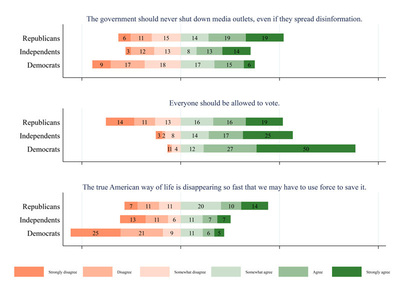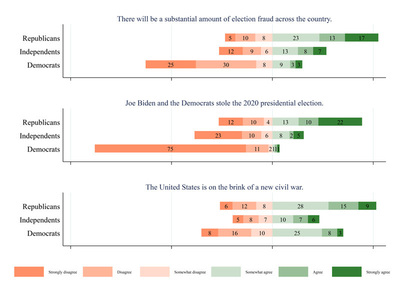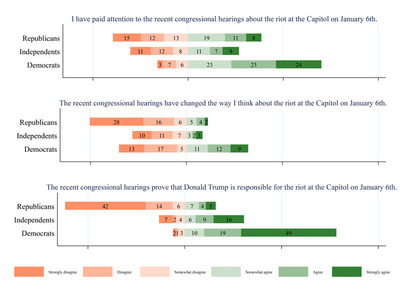A new nationally representative survey released by the University of Notre Dame’s Rooney Center for the Study of American Democracy reveals areas of grave concern for the state of American democracy, including more than half of Republicans and one-third of Democrats believing the United States to be on the brink of a new civil war.
The results also show strikingly low support for some core democratic values and the number of Republicans who continue to doubt the integrity of both past and future elections.
Matthew Hall, the Rooney Center’s director, said the survey’s results indicate the threats to American democracy have never been more serious. Although the 2022 midterm elections will not be where America loses its democracy, he said, they could very well set the stage for its downfall.
“Is it really as bad as it seems? The answer is yes,” said Hall, the David A. Potenziani Memorial Professor of Constitutional Studies. “The key is not that what happens in the midterm elections will be inherently anti-democratic — it’s that they may put in place officials who could then undermine our democracy in 2024. We’ve already seen members of Congress willing to overthrow perfectly legitimate election results, and we may see a lot more of that in 2024 if Republicans take the House and the Senate.”

The comprehensive survey, which was conducted from Oct. 20 to 26 using a scientific sample that was representative of the American population, showed that many Americans question basic democratic principles — though there are strong partisan differences in these attitudes.
Democrats are more likely to be skeptical of free speech rights, with 44.7 percent agreeing that the government should be allowed to shut down media outlets that spread disinformation. Republicans, however, are more likely to favor voting limitations, with 37.9 percent disagreeing with the statement that “everyone should be allowed to vote,” while just 6.7 percent of Democrats and 13 percent of independents disagreed.
Many Republicans also remain skeptical of the results of both the 2020 presidential election and upcoming elections — and question the stability of the U.S. system of government. Nearly half of Republican respondents believe that “Joe Biden and the Democrats stole the 2020 presidential election,” and just over half agreed that there will be a substantial amount of election fraud across the country in the midterm elections.

Notably, 22 percent of Democrats and 44 percent of Republicans surveyed also agreed that the “true American way of life” is disappearing so fast that “we may have to use force to save it.”
Slightly more than half of Republicans (51.5 percent), over a third of Democrats (35.1 percent) and nearly a quarter of independents (23 percent) believe the United States is on the brink of a new civil war.
“Those numbers are shockingly high,” Hall said. “Although other poll questions showed that very few participants said they’re willing to engage in political violence or support the use of it, it seems that everyone is expecting it. It’s an interesting, if worrisome, juxtaposition.”
The survey, which included 1,500 adults ages 18 and older, also examined the impact of the public hearings by the House Committee on the Jan. 6 attack on the Capitol. While more than two-thirds of Democrats and more than one-third of Republicans said they’ve paid attention to the hearings, only 32 percent of Democrats, 11 percent of Republicans and 8 percent of independents say the hearings have changed the way they think about the riot.

Seventy-eight percent of Democrats agreed that the hearings prove that then-President Donald Trump was responsible for the Jan. 6 riot at the Capitol, along with 31 percent of independents and 16 percent of Republicans.
“It’s very interesting to me that a lot of people paid attention to the hearings, including some Republicans and independents, but not many changed their perspective,” Hall said. “It worries me that comparable major events in history, such as the Army-McCarthy hearings in the 1950s, had a much bigger effect on public opinion. We may be in such a polarized era that it’s difficult to find a uniting message that will help move us past this moment.”
This survey is the first in the Rooney Center’s new biannual Health of Democracy Index and represents the center’s commitment to helping create a more just society, Hall said.
“We at the Rooney Center believe that the preservation of democracy and the democratic spirit in the American public is an essential part of Notre Dame’s larger mission to fight oppression and injustice in our society,” he said. “It’s a necessary condition for everything else we do.”
Originally published by at news.nd.edu on November 03, 2022.